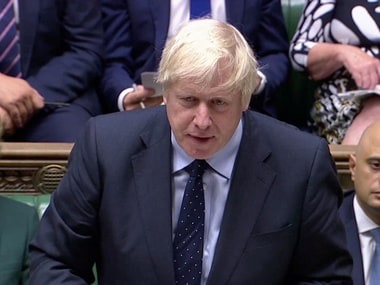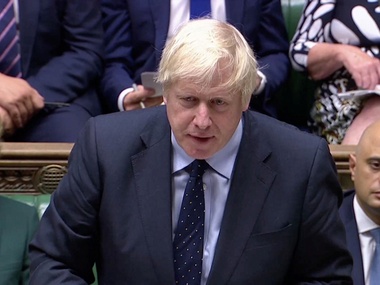Over the past few years, the United Kingdom’s prime minister Boris Johnson has expressed his views on Brexit on numerous occasions. While Johnson’s statements have mostly been marked by a belligerent tone, he has at times also been surprisingly accommodative, and on rare occasions even conciliatory. But first, a look at history would be in order. While Johnson has been an ardent advocate of the UK’s exit from the European Union since 2016, his earlier public positions have been precisely the opposite of what he now espouses. This has led some media reports to question if his statements are motivated by conviction or opportunism.
When Boris railed against Brexit
In his book, Friends, Voters, Countrymen in 2001, Johnson offered his view on why Britain should remain a part of the EU, saying that what “always just about clinches it for me is that we would lose influence in the designing of the continent. And it has been the object of 500 years of British diplomacy to ensure that continental Europe is not united against our interests". In May 2013, Johnson was less enthusiastic about the UK remaining a part of the bloc, and argued in a column in The Daily Telegraph that the UK should “renegotiate” its relationship with the EU, and added that “if we are going to have any chance of success in the negotiations, we need to show that the UK is willing to walk away.” However, even in this article, he contended that one of the benefits of leaving the EU would be that the country “would have to recognise that most of our problems are not caused by ‘Bwussels’, but by chronic British short-termism, inadequate management, sloth, low skills, a culture of easy gratification and under-investment in both human and physical capital and infrastructure.” This was a curious claim, coming as it did from someone who has more recently asserted, in his debut speech as prime minister, that Brexit would make the UK “the greatest place on earth.” Incidentally, this statement was quite similar to US president Donald Trump’s campaign slogan of “Make America Great Again”. [caption id=“attachment_7279081” align=“alignleft” width=“380”]  File image of Boris Johnson speaking in the UK Parliament. Reuters[/caption] As recently as February 2016, Johnson had said in an unpublished column that he would support the campaign for Britain to remain in the EU, according to the book All out war. He is said to have written in the column, “This is a market on our doorstep, ready for further exploitation by British firms… The membership fee seems rather small for all that access. Why are we so determined to turn our back on it?” This was in a context where the then UK prime minister David Cameron, who was also the leader of the Conservative Party to which Johnson belongs, had advocated against Brexit.
The tide turns
However, Johnson did not heed Cameron’s call for long, and on 21 February, 2016, he announced that he would advocate for “vote leave, or whatever the team is called.” In his address to mediapersons at the time, he cited the erosion of Britain’s sovereignty on issues such as employment, border control and human rights. He also lamented that there was “too much judicial activism, too much legislation coming from the EU.” Nevertheless, Johnson sought to make a distinction between the cultural ideas that Europe represents and the “political project” of the EU. He said, “This is not about whether you love Europe or not. Actually, I love Brussels, I used to live in Brussels – fantastic city, wonderful place – and I love European culture and civilisation.” After Theresa May took over as the United Kingdom’s prime minister, Johnson continued his attacks on the official government position, and began seeking a “clean break” from the EU. His criticism was directed at May’s “Chequers” proposal, under which the UK was envisaged as remaining closely tied to the EU on goods and agriculture, with the creation of a common rulebook. The proposal had promised ending free movement and also ending the jurisdiction of the European Court of Justice. However, Johnson said that the deal would mean “abandoning our seat around the table in Brussels and continuing to accept the single market legislation.” He opined that the proposal would be “substantially worse than the status quo.” Subsequently, Johnson resigned as foreign secretary in protest against the proposal. In May 2019, in an interview with Telegraph, even said that the EU to do something similar to Napoleon Bonaparte and Adolf Hitler in attempting to unify Europe under a single government.
Johnson’s statements as UK prime minister
On 24 July, shortly after taking over as Britain’s prime minister, Johnson promised to leave the EU on 31 October "no ifs, no buts" under a “new deal” with the 28-member economic bloc. He further said on the steps of 10, Downing Street, “Brexit was a fundamental decision by the British people. We must now respect that decision and create a new partnership with our European friends… The work begins immediately behind that black door and I take personal responsibility of the change I want to see.” Reacting to attempts by parliament to block a no-deal Brexit, he said on 9 September in Ireland, “I’m absolutely undaunted by whatever may take place in parliament. I think what the British people want us to do is to deliver a deal and to get on and take us out on 31 October.” However, Johnson has been facing challenges from multiple quarters, most notably the EU. In August 2019, the bloc told the British prime minister that Britain will be solely to blame if it crashes out of the EU in a chaotic “no-deal” Brexit. On 5 September, the government abandoned attempts in the Upper House of Parliament to block a law aimed at stopping the country from leaving the European Union without a deal. Further, faced with opposition from sections of his own party, Johnson said on a visit to Dublin that leaving without a deal would be a “failure of statecraft”, as reported by CNN. However, more recently, measured comments about statecraft have given way to references to the Incredible Hulk . In an interview to the Mail on 15 September, he compared Britain to the comic book character and quipped, “The madder Hulk gets, the stronger Hulk gets and he always escaped, no matter how tightly bound in he seemed to be — and that is the case for this country.” With the Brexit deadline getting nearer and the pressure growing on Johnson, the British prime minister’s statements will now be keenly watched. Given his past record, one may well expect many eyebrow-raising headlines in the near future. With inputs from agencies


)

)
)
)
)
)
)
)
)



